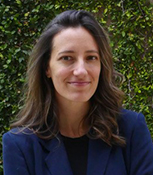Postdoctoral Fellow in Environment & Sustainability, UCLA / Assistant Professor of Environment & Sustainability, University of Buffalo
Holly J. Buck
Interviewers: David Spence
Interview date: May 20, 2020
Keywords: Negative Emissions Technologies, Environmental Equity
Social Acceptance of Negative Emissions Technologies
“I am really interested in the landscape as a unit analysis because it combines the biophysical features with the human features …. At the landscape scale you can actually think about the communities that are there, and what is valued [there]. I think it helps you see the human infrastructure on the landscape as well.“
“Our [evaluative framework for environmental ‘stopgap measures’] is basically a tool for policymakers to work through to make sure that they are capturing the equity dimensions of the stopgap. But not just the equity dimensions, also the workability of the effort to make sure it accomplishes what you want to do. … Who wins and who loses and why and how.”
“We need to have more of a social context for thinking about these [negative emissions] technologies. That need isn’t just a moral obligation… in order to avoid risks. … if we want to actually see carbon removal deployed at a climate significant scale, that will be necessary to have it happen. I don’t think that we are going to see these tremendous gigaton scale removals without deep, deep social engagement because the costs are just so high …”
Holly Buck is an Emmett Climate Engineering Fellow in Environmental Law and Policy at UCLA School of Law for 2019-2020, and Assistant Professor of Sustainability and the Environment at University of Buffalo beginning Fall, 2020. Her research focuses on environmental sociology, science and technology studies, and international agriculture and rural development. She received her B.A. from the University of Maryland Baltimore County, her M.Sc. in Human Ecology from Lund University in Sweden, and her Ph.D. in Development Sociology from Cornell University.
.
- “Evaluating the efficacy and equity of environmental stopgap measures,” Nature Sustainability (2020)
- After Geoengineering: Climate Tragedy, Repair, and Restoration (2019)
- “Perspectives on solar geoengineering from Finnish Lapland. Local insights on the global imaginary of Arctic geoengineering,” Geoforum (2018)
- “The politics of negative emissions technologies and decarbonization in rural communities,” Global Sustainability (2018)
- “Rapid scale-up of negative emissions technologies. Social barriers and social implications,” Climatic Change (2016)
To learn more about Holly Buck, please visit her home page: HERE


Recent Comments